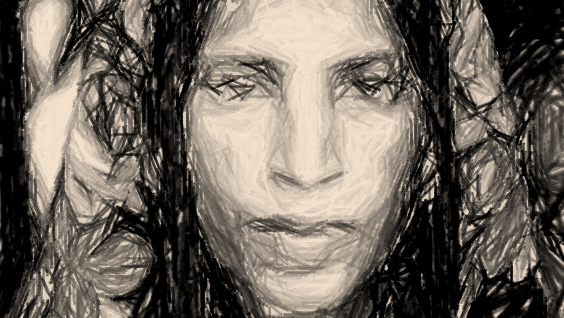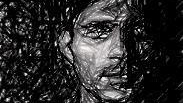Ahmed Ilias is a writer, journalist, social worker and poet. He is a ‘Bihari’ who migrated from Calcutta in 1953 to what was then East Pakistan. He wrote a book called Biharis. The Indian Emigres in Bangladesh: An Objective Analysis (2003) which was translated into Bengali. He’s been one of the only older Bihari voices talking about integration. He currently heads the Al-Falah NGO which works with the Urdu-speakers who live in various camps to help them integrate mainstream Bengali society.
My journey
I was born in Calcutta’s Taltola area on the 23rd November 1934. I completed my education when I was 15 years old from Calcutta Alia Madrasah – the first school established in 1781 by the British for Muslims. I was admitted there in class 4 and always stood first up until class 9 when I had to leave. This is because due to Partition the scholarship I used to get (from the Haji Maushid Fund) got stopped and the money got diverted to Pakistan.
Around the same time a friend sent me a card from Dhaka telling me to come visit. This was in 1950. Unfortunately I arrived the day the government stopped registering new refugees coming to Dhaka or Khulna so I wasn’t registered as a refugee which means I couldn’t get access to funding to complete my education. I returned to Calcutta and got admitted to Islamia High School in class 9 but just as I was going to sit for the SSC exams I fell seriously ill.
As my adopted mother did not have any means she couldn’t afford any treatment to cure me and I couldn’t be admitted to hospital. My father’s elder sister who had married a rich man wrote in to ask me to come join her in Dhaka. I took a Pakistan permission migration certificate from Calcutta and left for Bangladesh again – it was in 1953 and this time I was nineteen. My aunt paid for the treatment, and I got better. But the problem was that as a refugee one had privileges, as a migrant, one had none.
The syllabus was different from the one I had been accustomed to, besides, even though my paternal aunt was living comfortably with her friends and I was extended hospitality and food, I needed pocket money to get by. So I decided to take up a job. I juggled a few of them before finally getting enrolled as a trainee in the Survey of Pakistan Department. As I mentioned earlier, I traveled to Chittagong and Rangpur for months on end due to my job and my aunt started worrying about the fact that I had no wife to take care of me in those remote places; so she decided to organize my wedding.
My paternal aunt had continued living with my father after my mother had died to look after my brother and sister. She was married to a rich man who was a labor contractor. She was soon widowed but was left with a huge fortune and no children. On one of her trips to Mecca she made some close friends who were very well-connected and rich. One was a woman from Dhaka who was married to the richest fruit merchant of the day and another was the wife of one of the judges of the Calcutta High Court – they were both Urdu-speaking Bengalis. When my father remarried, my aunt had stopped her support towards our family and had left for Dhaka because of my step-mothers’ nastiness.
All of us gradually left the paternal household at the time. My brother went to live with his in-laws in Ghatshila (near Jamshedpur) and fell into utter poverty. My sister, who was widowed early and rich (she had been married to a contractor), left for Pakistan. And I had gone off to Dhaka to live with my aunt.
Settling In
I have a film-like autobiography which I’ve written up. I came to Dhaka as a migrant so I know the sufferings of migrants. Here in Dhaka I passed my school certificate exam and was recruited as a survey trainer for the Pakistani government. This enabled me to travel all over Bangladesh – I went and stayed 6 months in the Chittagong Hill tracts, then Rajshahi and Rangpur. But because I was an urban boy from an urban society I decided to give up my training as a surveyor as it meant living in rural hinterlands and decided to join the Dhaka Press Club instead. I loved writing and felt I would do better as a journalist and writer. I was soon appointed secretary.
This gave me the chance to work in my preferred domain which was literature and meet journalists, poets and writers and start a relatively comfortable life in Dhaka. The political situation of those times was very interesting and I started writing reports. I had joined as a journalist and was soon reporting on the issues of the needs and demands of the East Pakistanis.
In 1964, there were terrible communal riots and many people came from Jamshedpur and Rourkela. I was assigned to cover their life as refugees in Dhaka. After 1964, politics took a new turn in East Pakistan. In 1966, Mujib proclaimed a 6-point plan titled ‘Our Charter for Survival’ at a national conference of opposition political parties at Lahore and in 1971 East Pakistan became Bangladesh – an independent country. We lost our homes, our jobs, our rights.
I joined as a social worker a missionary organization from the UK called Heed-Bangladesh. It is this organization which became the Al-Falah NGO which I now run. It was during this period that I started writing about our history [in English]. I was very hay when the book was out and I’m glad it has also been published in Bangla. Many people are still ill-informed about Biharis and their issues. Between 1947 and 1971 there was no problem for them – people did not know about them too well, I call it ‘the silent period’.
Conflict and Peace
The main problem of our community is that we lack education. And because of this we’ve been time and again misguided. India was divided on religious issues and Urdu-speaking people knew that Bihar or UP would never be part of Pakistan. In Bihar, Muslims were in minority, they were just 12% of the population and they were uneducated. Their social and political status was very low. They were made to believe that they would benefit when Pakistan was created. And then they were exploited and finally abandoned for their lack of understanding of history.
They still believe in an ideology which is dead – the idea of Pakistan based on one’s Muslim identity. As we saw, cultural identities are important too. Pakistan may not even be there a few years from now – it might just dismember again on cultural issues. Before 1940 nobody thought there could be a Pakistan, it took 7 years to create a new country and this country lasted only 24 years. Now people are not a two-nation theory but a two-community theory. The two-nation theory did not make sense even in the beginning as there were more Muslims in India than in the Pakistan of 1947. Jinnah had suggested a federal system which Nehru refused and the media and historians blamed Nehru for this.
My wife was born in Bihar (Moratalao) and she migrated with her family to East Pakistan. Her father (who was actually her step-father) was the head-clerk of the school I was studying in. We were married in 1959. We have a son (two other sons died) and six daughters. Of my six daughters, five are married, the youngest is unmarried and doing a hospital management course. My eldest daughter married a boy from Kolkata, but they both live here in Dhaka. My second daughter is married to a Bengali boy from Faridpur. My third and fourth daughters are married to two Benali businessmen from Noakhali. My fifth daughter is married to a Bengali, also from Noakhali, and they are both settled in Canada. Their children will remember me as a foreigner to their country.
I didn’t organize the weddings of my daughters. We’ve always lived outside the camps. Those who live outside the camps are both integrated and educated. A few of us have educated our daughters but it is difficult to find suitable Bihari boys because very few of them are educated. My mission in life has been to see that the Biharis should leave the camps and integrate into the mainstream Bengali society. Only this can save the present generation. My life could easily be turned into a Bollywood movie. You know, my eldest daughter is married to the son of the woman I was in love with. The boy came to my house one day all the way from Calcutta saying his mother had sent him. So at the wedding of my daughter and my beloved’s son, I saw my childhood sweetheart again after all these years. And in a weird quirk of fate I had to stay in the same room as her.
We had been in love with each other for a very long time. Our marriage had been fixed but just as the maulvi was going to solemnize it, my step-mother stopped the wedding saying that this marriage couldn’t go on without the presence of my father. Then life took over and we got separated.
Our chapter is going to be closed and a new chapter is going to be open. So you have to give them freedom to shape their lives in this country. Otherwise, what is the benefit of the education and experience which I have earned? There is nothing there. You don’t have a root to go back to. History has abandoned you so you have to make your own history. Urdu wasn’t the language, Persian/Farsi was. Urdu has no value, it may be your mother-tongue but it now has to be Bengali. Just as Persian has gone, Arabic has gone, so too Urdu will go.
I am proud to be considered an Urdu poet and I am known for my Urdu poetry [for which he is widely recognized and has received numerous prizes]. But I know that after me there won’t be anybody carrying on the legacy. This is a historical process. Maybe amongst my children there will emerge one as the greatest Bengali poet. Tradition will be carried on like that. Many in the subcontinent had parents who were Persian poets, their children are perhaps Urdu poets today, maybe they will be Bengali poets tomorrow.
I am now working at Al-Falah and writing about Biharis and their issues and poetry. I lost my profession as a journalist in 1971 and was unemployed until 1975. After 1975 I have been working with the NGO HEED-Bangladesh, when HEED handed over the project to Al-Falah, I was accepted as its Executive Director. The previous donors of the Al-Falah were ODA, BPHC (Bangladesh Population and Health Consortium) and the British Govt. Al-Falah is a rights based organization for the restoration of the rights of the Urdu-speaking camp people, ‘Bihari’ is a derogatory term.
When I came here in 1953 I had to struggle; I was given shelter by my aunt as she was fond of me. I was very young and because of my heart-break caused by not being able to marry the one i loved I came here. I felt there was a poet in me, an artist in me. In Pakistan my poems were being published. At that time my neighbor and myself started studying for the same examination. I found in her the same inclination for progressive literature so we had feelings for each other. She was called Husne Ara. We studied together. I was still a poor child so it was difficult for me to buy books and paper and she used to provide these for me. And I fell in love for the second time.
Because of our close association, our studies, and our affinities for each other we went to the park and to cinemas together and were sure we would get married to each other. Then I got a job as surveyor and I announced to my aunt that I would have to leave for Chittagong. She knew the Head Assistant of the Calcutta Massilia School, and after having a word with him asked me one day ‘are you ready to marry Husna Ara?’, I replied ‘Yes, very much’ and was very happy that things had been so easy.
It was only when my potential father-in-law arrived with the ring that I realized the mix-u that had happened. I will accept all my miseries I tried to console myself. The first Husna Ara, the one I was in love with, was charming, educated, and would easily find a suitor, I argued to myself. My wife-to-be was also called Husna Ara. She was an ordinary girl. She was not bright, not very beautiful and she had a slight limp but my aunt had done so much for me that I couldn’t refuse. Besides, this girl too had step-parents. I thought I might be the first person to ever accept her and love her for what she is. I got a chance to make life more beautiful for her, but me, I had to sacrifice again.
When my sister’s husband lost his job as a sea-man and then died she followed me to Bangladesh. But this was in 1970 and she soon left for Pakistan where she lived with her son before dying. On one of my visits to Karachi I tried to locate my nephew but have never been successful in doing that. I am in touch with my elder brother’s children. They all live in Ghatshila in relative poverty working as drivers and tailors or remaining unemployed. My brother’s family is destroyed.
My brother was fluent in English because he used to work in a British military canteen and used to talk with Brits all the time. Then he worked at the Metro Golden Mayor (MGM), popularly known as the Metro cinema. He was treasurer of the MGM. It was a first that such an office had been given to a Muslim. As the treasurer of the MGM he had a private secretary and started eating with a knife and fork even at home. My father got scared and decided to marry him off quick. They found a girl in Ghatshila who was both very beautiful and from the same family. When their first child was born, a daughter, they called her ‘Roshni’ but after this birth my brother’s behavior changed again. He had initially been happy to leave Calcutta because of our step-mothers’ behavior. He worked at the ICC (Indian Corporate Corporation Ltd) of Ghatshila and lived with his in-laws. But when I went in 1956 to Ghatshila to see them I noticed he had become very traditional. He had gone to perform Haj, had lost his job, and was an adherent of Sufism.
I have no idea why that happened. He used to be such an Englishman. He replaced his hat for the cap and followed the tradition of his grandparents. I stayed there for three or four weeks and then returned to Dhaka with my wife. My brother was so poor that I financed his daughters’ weddings. My brother simply couldn’t adjust. That man who was so advanced and modern was now completely changed and the whole family became ruined. I could only support him by giving him money and organizing the marriage of his three daughters.
Once, when I had to stay in Calcutta for a night before going to my brother’s house, I went and stayed at my adopted uncles’ house and he put me and my wife up in a room which had been my first loves’ room. She was away that evening and her room was free so we stayed there. Her husband was a sea-man and her name was Shehzadi (princess). It was Shezadi’s son who came to Dhaka sent by his mom and Ahmed and Shehzadi met again on their children’s marriage to each other.
‘My dream, after 1971, has been to better understand. In the three main countries of South Asia, nobody wanted the Biharis. I have tried to give a background, highlight the history of Biharis. This so that they may know and become aware of their history and background. Of those who live outside the camps 78% are literate, of those who live inside the camps, only 6% are literate. I want their struggle to be highlighted.’ ‘All I want is to build a new world for my descendants where our first identity will be as humans.


